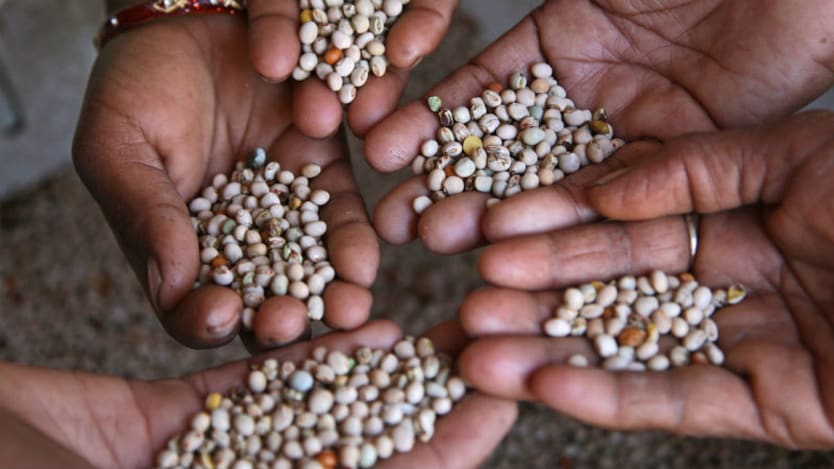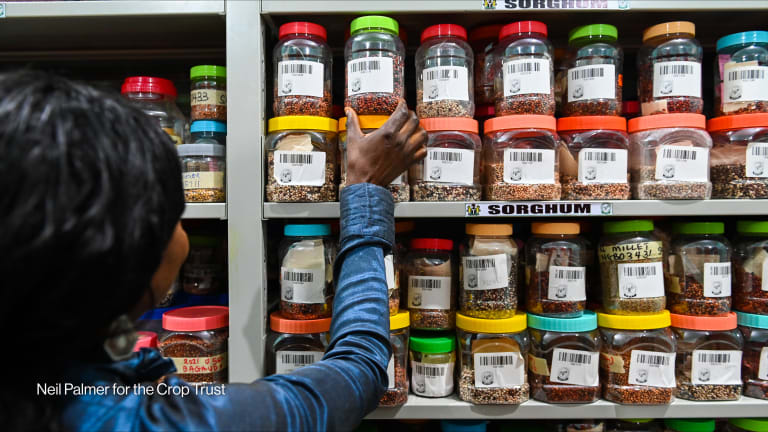
“It is the seed that controls the system, not the other way around.”
Chef and seed company owner Dan Barber reminded us of this fact in his thoughtful analysis of the global seed industry’s evolution over the past 150 years. Barber described the rapid proliferation of patents on crop traits, the concentration of the crop science industry into the hands of just four multinational companies, and the stagnation of U.S. public spending on crop improvement for a healthier and more sustainable future.
Explore Devex’s dedicated news section with regular, editorially independent coverage of the challenges, solutions, and innovations in nutrition, with financial support from our partner DSM.
The problems Dan Barber identifies — particularly insufficient investment in plant breeding and crop improvement — are even more pressing in less-developed countries, where livelihoods often depend on the ability of smallholders to produce food on degraded soils, without sufficient irrigation, and at the mercy of both climatic shocks and market price volatility.
If these farmers are going to be able to grow enough food to rise out of poverty, provide sufficient calories and healthy food options for growing populations, and do it all in an environmentally sustainable manner, they are going to need better seeds and traits. And many of those seeds and traits will require other inputs, such as fertilizers and machinery to encourage yield growth and protect crops from pests, disease, drought, and other stresses.
To get those better seeds and traits, we must increase public investment in crop improvement programs that are specific to the needs and conditions of low- and middle-income countries.
Eighty percent of the land in sub-Saharan Africa and Asia is managed by smallholder farmers. But public investment in crop improvement programs that should support those farmers has stagnated in most LMICs in recent years, despite mounting biotic and abiotic stresses on food production resulting from adverse weather conditions and long-term climate change.
Crop improvement has been a major part of the solution to malnutrition and poverty reduction during the past 60 years. A study in Science revealed that high-yielding crop varieties — including the famous semi-dwarf rice and wheat varieties of the Green Revolution — accounted for almost 40% of the growth in cereal production in low- and middle-income countries from 1981 to 2000.
Without the development of these new varieties, we would have likely seen 23.5% lower yields, 18% lower crop output, and 14% fewer calories consumed than actual levels in LMICs by the end of the 20th century. Less production would have meant higher prices and an expansion of cropped area to make up for the loss in value, adding environmental consequences from increased deforestation and tillage.
► Okra, onions, peas: Could permagardens help solve refugee malnutrition?
► How to better integrate gender equality and nutrition
► High cost of healthy food linked to stunting, new study finds
Many of those late twentieth century improvements continue to benefit us today. The development of high-yielding mosaic disease-resistant cassava varieties in the 1970s, known as Tropical Manioc Selection, increased cassava yields by 40% without the use of fertilizer, helping to maintain the crop as a reliable source of food and income in parts of western and central Africa.
More recent advances in conventional breeding methods have led to the development of promising new vitamin A-enriched cassava varieties that further improve the crop’s nutrient content and value.
Twenty years later, we are faced with new challenges that require new strategies. And those strategies will often require careful deployment of the most advanced scientific and technological tools available. These tools need to be available to public researchers in LMICs whose goals are to improve food security among their fellow citizens. The deadly emergence of maize lethal necrosis in eastern Africa is but one example where we need all the tools we have to combat the devastating threat to livelihoods in the region.
But particularly vulnerable regions of the world, especially Africa south of the Sahara, simply do not have enough plant breeders to tackle the challenges; while many key indigenous crops that could contribute greatly to improving food security and nutrition — cocoyams, cowpeas, groundnuts, millet, plantains, sorghum, taro, teff, and yams — receive little attention because they are not globally traded.
But the work does not end with more funding for crop improvement programs, more breeders for more crops, and more seeds and traits for smallholders.
Change is needed in how funding is managed. That means moving away from the short project cycles preferred by bilateral and multilateral donors, and reshaping the structure, organization, and management of overly bureaucratic research systems. And finally, we need to move research and development from the research station to farmers’ fields with greater efficiency, using both markets and nonmarket channels to introduce smallholder farmers to new seeds, traits, and crop management practices.
Private companies can contribute to these solutions with their scientific assets and expertise. Several mechanisms, including humanitarian use exemptions to grant public researchers access to proprietary traits; collaborative public-private research projects; commercialization programs that move public research into commercial use; XPRIZE-style competitions; and precompetitive platforms for sharing data have been explored for a number of intractable challenges that cannot be solved by the public or private sector alone.
In the meantime, policymakers need to recognize the importance of investing in scientific capacity and crop improvement. The returns may not be visible within a single season, year, or election cycle, but they are investments in the future much like health clinics and schools are.
If the seed controls the system, then the system needs to invest in seed. If governments provide resources commensurate to the challenge ahead, we can look forward to more diversified systems and greater resilience to the many challenges facing the planet.
This focus area, powered by DSM, is exploring innovative solutions to improve nutrition, tackle malnutrition, and influence policies and funding. Visit the Focus on: Improving Nutrition page for more.








